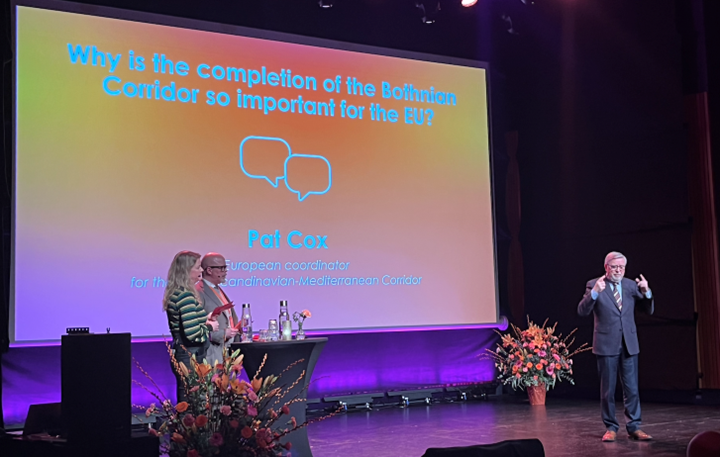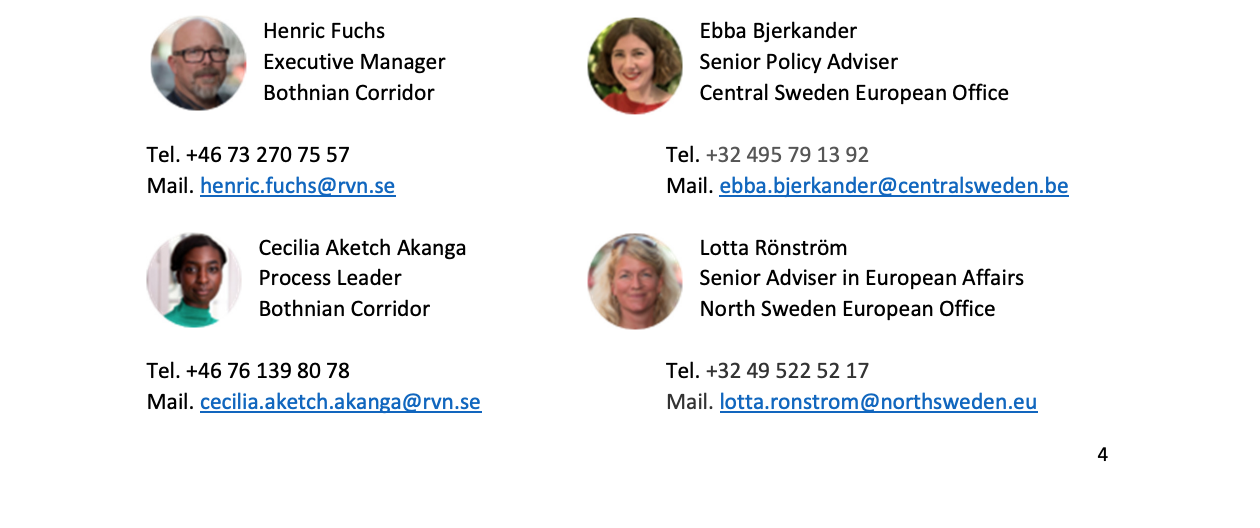Bothnian Corridor Newsletter: Setting the Stage for Swedish Infrastructure Policy

The Bothnian Corridor has a long experience of working with infrastructure policy at both EU and national level. We recognize the paramount importance of access to accurate and timely information. Informed discussions and negotiations are the cornerstone of effective policy outcomes. Therefore, we have decided to offer this newsletter with bitesize information on some of the latest developments in Swedish transport policy.
New Government, New Directives: What Lies Ahead for Swedish Transport Policy?
On the 11th of September 2022 Sweden held general elections to the Riksdag (Swedish parliament), municipal and region assemblies and 37 days later, Sweden could introduce their new national government for the next four years. With the establishment of a new government a new process revising the Swedish long-term infrastructure planning, otherwise known as the National plan which follows the political cycle and (normally) initiated every four years, could commence.
The process of revising the current National Plan starts for real when the Swedish government (regeringen) announced their framework directive (inriktningsdirektiv) to the Swedish Transport Administration (Trafikverket), on the 15th of June 2023. The directive outlines the basis for the Swedish Transport Administration's focus when crafting the National Plan1 and starts a process which ultimately ends with the adoption of a new plan, which is set preliminary early 2026.
Finding Common Ground: New Directives Pave the Way for Closer EU Alignment
The new directive includes familiar elements, such as climate goals and Sweden's overarching transport objectives. However, it also introduces novel aspects, such as a prompting to acknowledge international legal frameworks, particularly pointing to that EU agreements and the revision of the TEN-T regulation, emphasizing co-financing possibilities through the CEF framework but also other more novel alternative financing methods. The directives also advocates for a more holistic assessment of project impacts within the National Plan, in which the current norm is to look at the effects of single measures in isolation, instead of assessing the system effects of completing several measures for longer routes and corridors.
Shaping the Policy Landscape Beyond the National Plan
The transformation of Swedish infrastructure policy extends beyond the National Plan preparation. Recent developments include:
1. Restructuring of the Swedish Transportation Administration
Starting January 1, 2024, the Swedish Transport Administration will reorganize its regional departments to align with the geographic boundaries of Swedish Civil Preparedness jurisdictions. For the Bothnian Corridor this restructuring would mean that the projects within the Bothnian corridor would go from being under the jurisdiction of three different administrative divisions to falling under two. In response, the Bothnian corridor has invited the Director-General for the national Swedish Transport Administration as well as the newly appointed directors from the Northern and Middle Transport Administration divisions to discuss the possible positive and negative repercussions.
2. A Strategy for Northern Sweden
On January 11th, 2023, the Swedish presidency of the Council of the European Union invited the European Commission to Sweden's northernmost municipality, Kiruna, to kick-start Sweden’s presidency. The visit highlighted the quickly growing industrial developments in northern Sweden and in conjunction with the visit Swedish Minister for Energy, Business and Industry together with the Minister for Employment and Integration as well as the Minister for Infrastructure and Housing published an article about the government’s plan to draw up a strategy for Northern Sweden. The aim of the strategy is to address the need to coordinate a growing number of issues such as need for increased housing, better transport and energy infrastructure as well as a need to attract skilled workforce. To coordinate and support all these efforts at a national level is deemed especially pressing. This is due to the large investments that regions and especially municipalities have made to ensure the establishment of new industries that in the end will benefit the whole of Swedish economy and contribute to increased European competitiveness.
Not much is known today of what the process for this strategy will look like. Furthermore, many questions remain on how it will handle issues related to infrastructure. One such burning question is if the strategy will release funding opportunities outside the budgetary framework of the national plan. The little we do know, is that the strategy has been assigned a coordinator within the Ministry of Climate and Enterprise and that the geographic scope of the strategy is restricted to the counties of Norrbotten and Västerbotten. The possible policy implications of this strategy will most likely remain a talking point during the whole political mandate period.
3. Directive to Analyse Measures in the Transport Infrastructure in Norrbotten and Västerbotten Counties
On the 5th of April 2023, the Swedish government directed the Swedish Transport Administration to assess transport infrastructure measures in the Norrbotten and Västerbotten counties. The background to this directive can be linked to the 3 27th of September 2023 pressures of the new intensive and industrial establishment in northern Sweden and the above-mentioned, Strategy for Northern Sweden.
A report was presented to the Swedish government on the 15th of September 2023, the findings describe the status and planning situation for the measures in the current national transport mode-wide plan that address the shortcomings and bottlenecks that may worsen in the transport infrastructure, due to ongoing and planned industrial investments. In the report the Transport Administration describes what measures could be pushed forward within the budget framework of the current national plan. The report also analysed measures that could have great impact on the effectiveness of the transport system if pushed forward but lack the budget within the current plan to be completed without new monetary reinforcements. For these objects the Transport Administration suggests financing the budget deficiencies through loans.
The report also introduces a burgeoning idea from the Swedish Transport Administration to establish a cross-border collaborative platform, named Platform North. The platform would include Norway, Finland, and Sweden as well as regional stakeholders to address the growing infrastructure challenges experienced in the region.
4. Engaging with the EU
On the 13th of July, the Swedish Ministry of Rural Affairs and Infrastructure sent an invitation to several stakeholders within different regional governments such as the Region of Dalarna and the Region of Västerbotten (both a part of the Bothnian corridor), varied state agencies and some selected businesses within the railway transport sector to give their opinion on the proposed EU regulation on the use of railway infrastructure capacity in the single European railway area. The Bothnian Corridor actively participates in discussions about the proposed EU regulation on railway infrastructure capacity, seeking to contribute its perspective and will participate in both national and EU level consultations.
The Bothnian Corridor: Pioneering Infrastructure Excellence
Amidst this dynamic year in infrastructure policy, The Bothnian Corridor continues its active engagement. Here are some highlights:
1. Railway Forum North/Järnvägsforum Norr
On the 30th of March 2023, the annual event, Railway Forum North, was held in Luleå with great success and the Bothnian corridor participated as a speaker. While there, the Bothnian Corridor emphasised the potential of CEF as a financing instrument, advocated for a systemic approach to infrastructure improvements and spoke of the need to think in terms of military mobility, considering the current security climate and concerns. The event invited infrastructure stakeholders from all over the country as well as neighboring countries, such as Norway and Finland. Speakers and participants from a wide number of fields such as the Swedish Minister of Infrastructure and Housing, there was high-level participation from the Swedish Transport Administration including their Director-General, members from the Swedish Defence Agency, the 4 27th of September 2023 Coordinator of the Scandinavian-Mediterranean Core Network corridor, as well as important stakeholders from industry and commerce.
2. First Swedish EU Presidency event on military mobility
On June 19th and 20th, The Bothnian Corridor and North Sweden European Office played a pivotal role in hosting the first-ever EU event on military mobility together with the Swedish EU Presidency, addressing EU-NATO collaboration and regional experiences in addressing civilian needs in military mobility discussions. The meeting was hosted in cooperation with the Region of Jämtland Härjedalen, as well as the Municipality of Östersund, the County Administrative Board of Jämtland, the North Bothnia Line, and the New East Coast Line.
3. Almedalen
The Bothnian Corridor made its presence felt at Almedalen, the biggest Swedish political event of the year. During the annual happening most of the political leaders from all the major Swedish parties attend and often address the nation in a speech. With this background, it is a given that the Bothnian corridor was in attendance. On the 30th of June 2023, the Bothnian Corridor together with our partners the New East Coastline and North Sweden European Office organised a seminar loosely translated to “Infrastructure planning - what is required for Sweden and the EU to move in tandem?”. The main aim of the event was to start a debate on what is needed to be done at a national level to make sure that Sweden can meet their commitment on ensuring the completion of the Scandinavian-Mediterranean Corridor by 2030. Included in our panel was political representation from the government Traffic committee, the Deputy Head of the representation of the EU Commission in Sweden, the Director-General of the Swedish Transport Administration’s, and Swedish Members of the European Parliament.
Stay tuned for more updates from The Bothnian Corridor as they continue to shape Sweden's infrastructure landscape and contribute to a better connected Europe. Visit their website here.
/The Bothnian Corridor network

